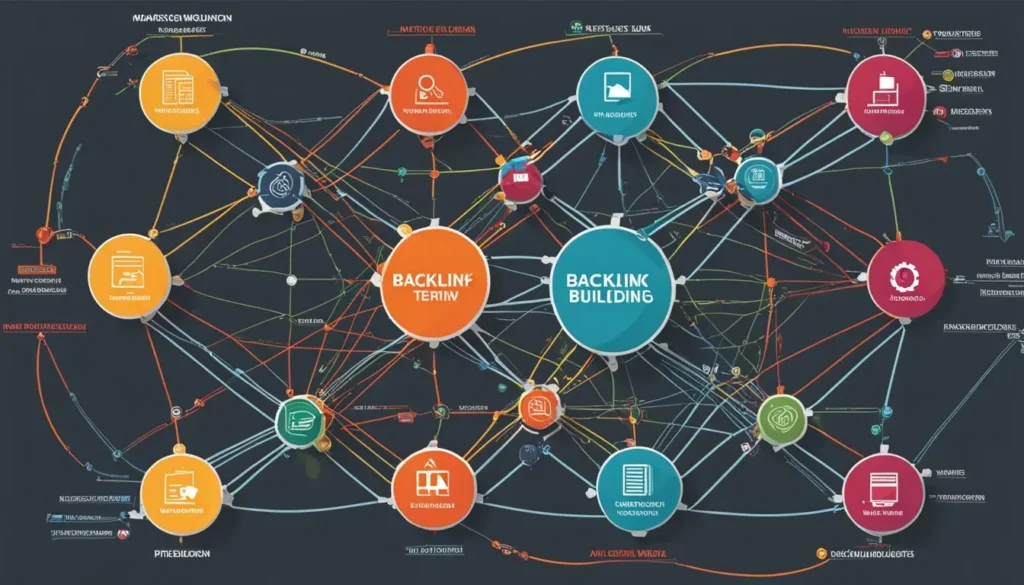In today’s world, almost everyone uses Google to find what they need1. That’s why it’s essential to learn about search engine optimization (SEO). When Google visits your site, it looks at its structure and content2. Making your website easy for people and search engines to understand is key. This means using clear URLs and organizing your pages logically. These steps help Google recognize your website’s value and visit it more2.
So, can creating great content boost your site’s visibility online? Absolutely. Content that engages users makes a big difference in how well your website shows up in search results. It attracts more visitors naturally2. But it’s crucial to follow SEO rules that focus on honesty. This approach, known as white-hat SEO, is about offering real value and building trust with your audience3.
Key Takeaways
- Google’s crawlers rely on links to discover pages, making a well-connected site essential for SEO2.
- A clear, logical structure with descriptive URLs can significantly help users and Google understand a website’s content2.
- Duplicate content confuses users and squanders valuable search engine resources2.
- Compliance with white-hat SEO and E-A-T principles can lead to improved search ranking and authority3.
- Content that resonates with the audience boosts a website’s chances of appearing higher in search results2.
- SEO success hinges on both on-page and off-page optimizations to cater to over 200 ranking factors in Google’s algorithm31.
Understanding the Core of Search Engine Optimization
SEO is a way to make your website stand out online. It uses tools like keyword research and meta tags. This helps your site appear at the top of search results. SEO makes sure your website is both helpful and trustworthy.
What is SEO and How It Impacts Web Presence
SEO uses many methods to improve your site’s rank on search engines. Using the right keywords in your page’s elements is key for SEO4. Tools like Google Search Console and AHREFs are important to check and improve your site4. Making sure your site turns visits into actions, like buying or signing up, is also crucial4.
Key Principles of Maximizing Website Ranking
Getting to the top of search results involves both on-page and off-page SEO. Choosing the right keywords helps your site match what users are looking for. This improves your site’s chance to be seen and brings more people in4. Also, having links from trustworthy sites shows search engines your site is reliable4.
Accurate meta tags and careful keyword use on your pages are very helpful. They let search engines know what your pages are about. This makes them more likely to show your pages in search results.
Getting links from other reputable sites is still very important for SEO success. It tells search engines your site is worth visiting. Combining all these efforts keeps your site up to date and draws in more visitors.
| SEO Aspect | Importance | Tools for Optimization |
|---|---|---|
| Keyword Research | Crucial for aligning content with user searches | Google Ads Keyword Planner, AHREFs |
| Meta Tags | Essential for proper page description and indexing | Google Search Console |
| Backlink Building | Enhances site credibility and SERP rankings | Majestic, AHREFs |
SEO is always changing as search engines update their systems. This means websites must keep up with the latest SEO tactics. Knowing SEO well is crucial for online success. It helps not just to get visitors but to turn them into customers.
The Essential Role of Keywords in SEO
Keyword research is at the center of SEO. It’s vital for effective digital marketing. Keywords act as guideposts for users. They help businesses lead people to content that matches their search intent56.
Using keywords strategically is crucial. It’s not just about adding them but knowing their power. The right keywords in key places like titles and body text can improve a website’s position in search results5. Long-tail keywords, which are specific, also help. They ensure content meets unique user needs6.
Having a strong keyword list can really change how a website performs. It matches content with what users actually look for, and this can boost the site’s visibility online5.
Understanding how search algorithms work is also necessary. They don’t rank pages solely by the number of times keywords appear. Instead, they focus on relevance. This makes well-placed keywords even more important5. Good title tags and meta descriptions are key too. They not only attract users but also appeal to search engines6.
- Creating a detailed list of relevant keywords is key to SEO success5.
- Using keywords wisely in URLs and descriptions boosts a page’s usefulness for searchers6.

Keywords will always be essential in SEO. They help sites connect with their audience better. This, in turn, improves a site’s performance in search results and brings in more quality traffic6.
On-Page Optimization Strategies for Success
On-page optimization boosts organic traffic and search result rankings. It fine-tunes web pages for search engines and users alike. By tweaking content, HTML, and page design, each site piece becomes more discoverable and appealing.
Title Tags and Meta Descriptions Best Practices
Adding thought-out title tags and descriptions is key to boosting rankings. They help grab user interest and describe page focus. Good ones draw people in from search results. They’re vital for SEO success.
Optimizing Your Headings and Content
Headings do more than organize text; they guide search engines. Using keywords in headings helps your content match user searches. It makes pages clearer, more helpful, and easier to find.
Focus on crafting valuable content that’s not stuffed with keywords. Make it easy to read and helpful for users. This approach improves your SEO without sacrificing quality.
Image Optimization for Faster Load Times
Optimizing images is crucial for faster loading times, which Google loves. It includes picking the right formats, compressing files, and using good alt text. Alt text helps search engines understand images, which can boost your site’s visibility.
Overall, on-page optimization aligns your site with what users and search engines need. It involves smart tag use, solid keyword research, and managing links well. Doing these things sets your site up for success, bringing in more visitors and climbing the search results.
Incorporating Effective Backlink Building Techniques
Backlink building is key in off-page optimization. It plays a big part in boosting website ranking and search engine optimization. This strategy can not only increase organic traffic but also enhance a site’s visibility and trustworthiness.
It’s known that backlinks are crucial. In fact, 8 out of the top 20 Google ranking factors relate to them9. For example, sites like bbc.co.uk have seen benefits from backlinks by reputable sites like cdc.gov and microsoft.com9. Also, the authority of the site linking to yours matters. Links from well-known sites like bbc.co.uk do more for SEO than those from smaller sites9.
Creating the right backlink profile goes beyond just getting a lot of them. It’s about getting links from sites that are similar to yours. This boosts how relevant your site is seen and its SEO performance9. Also, putting links in your content early brings more value. This matches Google’s ‘reasonable surfer model’9.
The text used in your links should be clear and relevant. It must feel natural to read. This is to prevent Google from thinking you’re trying to cheat the system9. However, not all backlinks are equal. Some have a ‘nofollow’ tag, which means they don’t add to your SEO strength9.

Email Outreach is a potent method for getting good backlinks. It means reaching out to website owners or editors. You ask them to link to your content if it fits well with their site9.
Here’s a quick look at different backlink strategies:
- Earn Links: Get them naturally by creating top-notch content.
- Ask for Links: Directly approach others in your industry for links.
- Add Links: Putting your own links in directories or forums (not the best idea).
- Buy Links: Buying links from other sites (this is frowned upon in SEO).
| Strategy | Effectiveness | SEO Impact |
|---|---|---|
| Earn Links | High | Strong Positive |
| Ask for Links | Medium | Moderate Positive |
| Add Links | Low | Negligible or Negative |
| Buy Links | Low | Negative (Unethical) |
To make backlink building work best, align it with strong on-page optimization. This makes for a complete SEO strategy. It helps boost your website’s search engine performance and credibility together.
Leveraging Off-Page Optimization to Boost Rankings
In today’s digital world, off-page optimization is crucial for improving search engine optimization (SEO). It helps websites rank higher10. Key tactics like backlink building, being active on social media, and writing for others’ blogs are vital. They bring in more visitors and lead to better search results over time1110.
Essential to strong off-page SEO is having lots of links from reliable places. Links from respected sites are especially important. They show search engines your website is trustworthy and credible11. With social media giants like LinkedIn and Facebook, you can boost your SEO big time11.
Let’s look closer at the effect of different off-page tactics with a detailed table:
| Technique | Impact on SEO | Benefits |
|---|---|---|
| Backlink Building | High | Boosts your website’s authority and its search result position10 |
| Social Media Engagement | Moderate to High | Makes your brand more visible and helps with linking to your site10 |
| Guest Blogging | Medium | Connects you with new audiences and brings in specific visitors11 |
Also, guest blogging is great for reaching already-established readers. This way, your website can get more attention and the right kind of visitors11. Adding smart keyword research can further boost your site’s importance and improve your SEO12.
It’s important to note that things like responding to reviews and listing your business locally are part of off-page SEO too10. They help with ranking better in local searches and making your brand look reliable10. Businesses that excel in off-page SEO handle changes in search rules better and often do better than their competition in being seen and interacting with customers10.
To wrap up, a strong off-page SEO plan, including linking well, using social media strategically, and writing for other blogs, is key for moving up in search results. It improves how many people find you and see you as an authority online in a fast-changing digital world1110.
Improving User Experience for Better Engagement
In the changing digital world, making the user experience better is key. It helps with getting more traffic from search engines and keeps users around. Experts say making a website easy to navigate helps users not get frustrated and more likely to stay13.
Creating User-Friendly Website Navigation
Good website navigation makes everything smoother. It’s all about setting up the site in a way that makes sense. Users should be able to find what they need quickly and without trouble. This makes users happier and the site easier for everyone to use. Plus, it helps with traffic and search engine scores13.
Enhancing Mobile Responsiveness
Most people look at websites on their phones, so being mobile-friendly is a must13. Websites that work well on mobile keep users interested and leave less often. Google even ranks sites better if they’re good on mobile13.
Balancing user experience with search engine optimization is key to staying competitive. A good mobile site makes people stay longer and interact more. This helps build trust and makes a site stand out13.
To do this, think about what people really need and less about stuffing in keywords. It keeps both users and search engines happy13.

Adding fun things like quizzes can really boost how users feel about a site. Done right, they make the experience better. This keeps users interested and meets the standards that search engines like to see13. Staying on top of these strategies and watching what works can make a huge difference in how well a site does13.
Delving into Technical SEO: Behind the Scenes Adjustments
Technical SEO is crucial for making a website work well and rank high on search engines. It deals with parts that are not visible but affect how well you show up on searches. Since search engines are always changing, keeping up with these technical updates is key to staying ahead.
Importance of Site Speed Optimization
Having a fast website is essential for a good user experience and SEO. Quick loading pages keep people interested and lower bounce rates. This, in turn, helps your site rank better on search engines14. You can speed up your site by using the latest tech, like content delivery networks, and reducing the number of requests your site makes.

Structured Data and Schema Markup Insights
Using schema markup makes your site’s information clearer to search engines. This improves how your website appears in search results15. It helps organize your information for search engines to understand better, and this can boost your visibility in searches16.
A well-crafted robots.txt and using meta tags wisely helps search engines find your most important content first. This improves how search engines and users navigate your site16. It’s also smart to check your site regularly to make sure you’re up to date with SEO practices, avoiding technical issues and keeping your site effective over time15.
Technical SEO is more than just one thing. It includes several strategies aimed at making your site strong and appealing for visitors and search engines. From making your site load fast to using schema markup, every step can help your site grow and attract more visitors in the long run.
Demystifying Search Engine Algorithms and Updates
The world of search engine optimization changes often. This is because search engines like Google update their systems to make search results better. They do this to offer a good experience to users looking for information.
Understanding Google’s Ranking Factors
Google uses many factors to decide which websites show up first in search results. It looks at things like if a site is easy to use on a phone, if it has helpful information, and how much people like to visit it. To do well in search results, a website must follow Google’s rules on good experiences, expertise, trust, and credibility. This means keeping up with how Google’s updates focus on making the web a better place for everyone. It’s important to keep your website user-friendly and full of quality information171819.
Keeping Up with SEO Industry Changes
Adapting to the changing SEO landscape is tough but key for your website to be easily found online. As Google and other search engines make updates, it’s crucial to not fall behind. This includes moving away from old tactics like using too many keywords. Instead, focus on getting links from other quality websites and making sure your content is useful for people searching the web19. Being quick to change with the industry can make a big difference in your website staying ahead.
To stay successful, you should always be learning about new SEO tactics and using them in your website. This includes focusing on making your mobile site as good as your desktop site. Also, having the right tools to analyze your website’s performance can help a lot. It lets you make decisions using actual data to improve how well your website does in searches19.
By understanding what Google looks for and keeping up with new SEO methods, you can improve how your website shows up in search results. This is important in a world where changes in SEO happen often.
Adapting and watching the SEO world closely is crucial. Google now values links from trustworthy sites more than ever. They help show your website is reliable and knowledgeable. Focusing on these areas matches what Google wants, which boosts your chances of ranking higher in searches1718.
| SEO Focus | Importance | Trends in Change |
|---|---|---|
| Mobile Optimization | Critical | Growing due to increased mobile usage |
| High-Quality Content | Essential | Focus on value and user engagement |
| User Experience | Paramount | Enhancing site navigation and load speed |
| Backlinks | Important | Shift from quantity to quality |
| Technical SEO | Increasing | Need for advanced tactics and tools |
It’s clear that keeping up with SEO changes and knowing how to align your website with Google’s goals is vital for anyone working in SEO. Doing so ensures your website stays visible and competitive in the digital space.
Analyzing and Measuring SEO Performance
Understanding SEO success needs close review of metrics. Checking how many visit your site from organic traffic shows if your content hits the mark. This impacts your site’s rank and its ability to bring in new and old visitors20. It’s key to compare your data to competitors’, spotting areas needing work and growth20.
The position of your keywords in search results is vital for site traffic20. Ongoing keyword research is crucial. The SERP visibility index sheds light on your search results appearances. This data highlights both SEO wins and areas for improvement20. Also, your CTR affects how many people choose to visit your site from search results20.
The main aim of SEO is to turn visitors into leads or customers. Tracking your site’s conversion rates helps understand how convincing your content is20. Looking at the bounce rate shows if your content meets visitor needs. It’s also crucial to check your website’s authority often. This informs search engine rankings and overall SEO strategy effectiveness20.
FAQ
What is SEO and How Does It Impact Web Presence?
SEO involves making your website more visible on search engines. This increases the chance of people finding your site. It aims to drive more traffic to your content from users searching for something specific.
What Are the Key Principles of Maximizing Website Ranking?
To boost your website ranking, use good SEO methods like relevant meta tags and keyword research. Also, make sure your site is well-optimized and it builds strong backlinks. Following these principles can enhance your search result visibility.
How Crucial Are Keywords in SEO?
Keywords link search questions to what’s on your website. Good keyword use will match your content with what users are looking for. This helps you show up more in search results, driving more traffic your way.
What Are the Best Practices for Title Tags and Meta Descriptions?
To make your titles and descriptions effective, make them eye-catching with keywords and brief. This maximizes your chances of being clicked on in search results by users. Titles should be about 60 characters and descriptions about 155 characters long.
How Should You Optimize Your Headings and Content for SEO?
Use key phrases in your H1 tags and text to make your content discoverable. Your content should be useful, engaging, and easy to read. Also, use subheadings to break up information. This helps both readers and search engines understand your content better.
Why Is Image Optimization Important for SEO?
Image optimization makes your website load faster, which is good for SEO. It satisfies users because they don’t have to wait for pages to load. Also, descriptive alt text helps search engines understand what the images are about.
What Backlink Building Techniques Are Most Effective?
Building backlinks by creating standout content, guest posting, and networking is key. This strategy gets you noticed by reputable websites. It shows search engines your content can be trusted, which can boost your rankings.
How Can Off-Page Optimization Boost Your Website’s Rankings?
Gaining backlinks from well-respected sites can up your site’s credibility. Other sites linking to yours is like a vote of confidence. Search engines respect this, possibly elevating your site in search results.
What Strategies Can Improve User Experience on Your Website?
Improving site navigation, creating interesting content, and being mobile-friendly help. These keep users happy and on your site longer. This is great for reducing bounce rates and increasing engagement.
How Does Mobile Responsiveness Affect SEO?
Being mobile-friendly is crucial since many users browse on phones. Search engines favor websites that work well on mobile. This can help you rank higher in search results, increasing your visibility.
Why Is Site Speed Optimization Crucial?
Site speed is important for keeping users interested. A fast site means less waiting and more browsing. Search engines like sites that users enjoy, so they rank them higher.
How Can Structured Data and Schema Markup Enhance SEO?
Structured data gives search engines more details about your content through markup. This helps them display your site more effectively in search results. As a result, more users might click on your page.
How Do You Keep Up with Google’s Ranking Factors and Updates?
To stay on top of Google’s changes, read updated SEO information and Google’s advice. It’s also helpful to engage with SEO experts. This way, you can adapt your strategy to the latest SEO trends.
What Are the Best Ways to Analyze and Measure SEO Performance?
Use tools like Google Search Console and Google Analytics to track site performance. They show how your site is doing in search, user interaction, and more. This data is critical for adjusting and improving your SEO approach.
Source Links
- https://rockcontent.com/blog/what-is-seo/
- https://developers.google.com/search/docs/fundamentals/seo-starter-guide
- https://blog.hubspot.com/marketing/tabid/6307/bid/1436/shortest-tutorial-ever-on-seo-search-engine-optimization.aspx
- https://www.optimizely.com/optimization-glossary/search-engine-optimization/
















